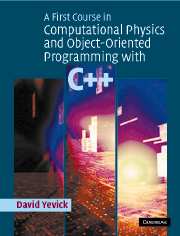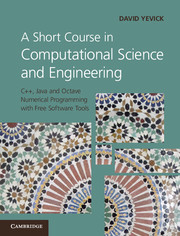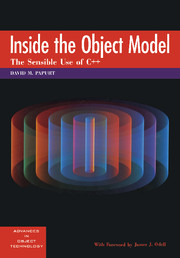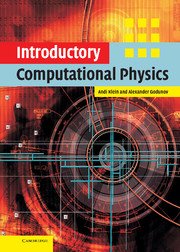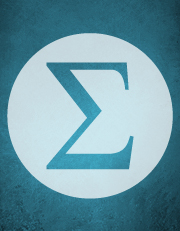A First Course in Computational Physics and Object-Oriented Programming with C++ Hardback with CD-ROM
Because of its rich object-oriented features, C++ is rapidly becoming the programming language of choice for science and engineering applications. This text leads beginning and intermediate programmers step-by-step through the difficult aspects of scientific coding, providing a comprehensive survey of object-oriented methods. Numerous aspects of modern programming practice are covered, including object-oriented analysis and design tools, numerical analysis, scientific graphics, software engineering, performance issues and legacy software reuse. Examples and problems are drawn from an extensive range of scientific and engineering applications. The book also includes a full set of free programming and scientific graphics tools that facilitate individual learning and reduce the time required to supervise code development in a classroom setting. This unique text will be invaluable both to students taking a first or second course in computational science and as a reference text for scientific programmers.
- Comprehensive presentation of all C++ language features of relevance to scientific programming
- Many innovatively structured scientific programming problems cover all standard examples
- Features material from a wide range of topics in object oriented and scientific programming not found elsewhere
- Well supported: free programming and graphics tool included on CD in book, solutions to exercises available from [email protected]
Reviews & endorsements
'… guides beginning and intermediate programmers through the difficult aspects of scientific computing.' Numerical Algorithms
'The best feature of the book is its good and concise description of the C++ language … The book would be a good fit for instructors who prefer to teach programming in detail. It is quite specific to C++ … ideal text for the student who is considering a career in scientific programming and wants to learn C++ very proficiently … an excellent book for a practicing computational physicist who wants to learn object-oriented C++ programming.' The American Journal of Physics
Product details
April 2005Mixed media product
9780521827782
414 pages
253 × 195 × 26 mm
1.2kg
4 tables
Unavailable - out of print
Table of Contents
- Part I. Basic C++ Programming:
- 1. Introduction
- 2. Installing and running the Dev-C++ programming environment
- 3. Introduction to computer and software architecture
- 4. Fundamental concepts
- 5. Writing a first program
- 6. An introduction to object-oriented analysis
- 7. C++ object-oriented programming syntax
- 8. Control logic and iteration
- 9. Basic function properties
- 10. Arrays and matrices
- 11. Input and output streams
- Part II. Numerical Analysis:
- 12. Numerical error analysis - derivatives
- 13. Integration
- 14. Root finding procedures
- 15. Differential equations
- 16. Linear algebra
- Part III. Pointers, References and Dynamic Memory Allocation:
- 17. References
- 18. Pointers and dynamic memory allocation
- 19. Advanced memory management
- 20. The static keyword, multiple and virtual inheritance, templates and the STL library
- 21. Program optimization in C++
- Part IV. Advanced Numerical Examples:
- 22. Monte-Carlo methods
- 23. Parabolic partial differential equation solvers
- Part V. Appendices: Appendix A. Overview of MATLAB
- Appendix B. The Borland C++ compiler
- Appendix C. The Linux/Windows g++ compiler and profiler
- Appendix D. Calling FORTRAN programs from C++
- Appendix E. C++ coding standard
- References.

